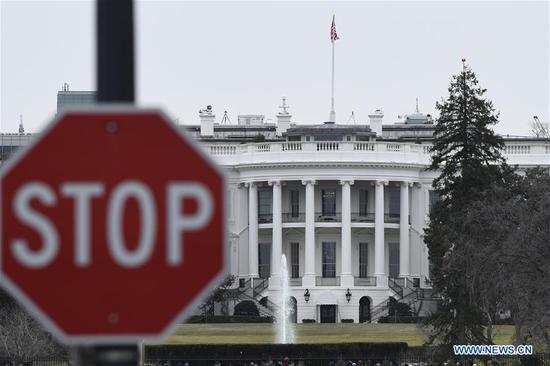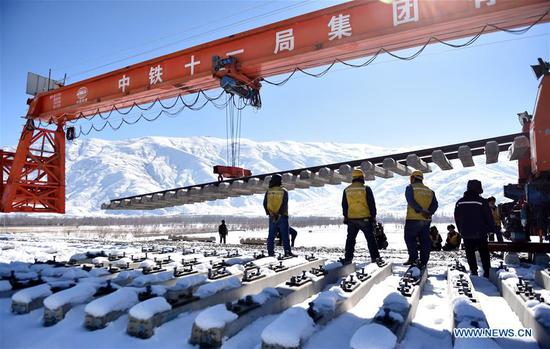
Photo taken on Jan. 12, 2019 shows the White House and a stop sign in Washington D.C., the United States. The U.S. government shutdown, which affected a quarter of federal agencies, stretched into the 22nd day on Saturday, eclipsing all the previous 20 such closures to become the longest in the country's modern history. (Xinhua/Liu Jie)
The U.S. government shutdown, which affected a quarter of federal agencies, stretched into the 22nd day on Saturday, eclipsing all the previous 20 such closures to become the longest in the country's modern history.
The shuttering stemmed from a budget standoff, in which President Donald Trump requested 5.7 billion U.S. dollars for building a wall along the U.S.-Mexico border, but congressional Democrats rejected his demand.
PAY DAY WITHOUT PAY
This week, some 800,000 government employees for the first time missed their paychecks.
"This is really an inflection point," a furloughed employee of the U.S. Department of Homeland Security told Xinhua earlier this week. He joined hundreds of people like him at a rally north of the White House to urge an end to the shutdown.
"People are not getting their paychecks, and the hardship is really going to set in for many of the families," he said on the condition of anonymity. "I just want to say that American federal workers are ready to work, and they shouldn't be caught in the middle."
There have been similar protests across the United States. Employees of U.S. Transportation Security Administration at Atlanta, state of Georgia, protested this week over having to work without being paid.
In the state of Florida, Miami International Airport closed one terminal for parts of the weekend since security screeners have called in sick twice the normal rate.
U.S. air controllers found a jarring "$0.00" at the net pay section in the wage information earlier this week. The National Air Traffic Controllers Association sued the Trump administration Friday, saying the government "unlawfully deprived" thousands of its members of pay "without due process."
"More and more government services are affected," Christopher Galdieri, assistant professor at Saint Anselm College, said. "The longer the shutdown goes on, the more uncharted territory we get into."
STALEMATE OVER BORDER WALL
Since the shutdown starting Dec. 22, the White House and the Congressional Democratic leadership have held several rounds of negotiations over border security and wall funding, but all ended in failure.
In a tweet Saturday, Trump again declared there is "a massive humanitarian crisis" at the U.S.-Mexico border. He has insisted that a wall or "a steel barrier" is essential to border security and keeping out "criminals, gangs, human traffickers and drugs." "Without it, our Country cannot be safe," he tweeted earlier this week.
The Democrats, led by House Speaker Nancy Pelosi and Senate Minority Leader Chuck Schumer, view Trump's border wall as expensive, ineffective and "immoral" and call the proposal "a political theater." They prefer the use of technology like drones and sensors in strengthening border security.
With Democrats showing no signs of bending, Trump has repeatedly floated the idea of declaring a national emergency, a legally-mandated executive power of a U.S. president. Such a declaration would enable Trump to bypass congressional approval and build the wall with Pentagon's allocated money.
Galdieri said an emergency declaration would be "the bizarre path" out of the ongoing stalemate and it "would set up a lengthy court fight with no guarantee of winning."
"I don't even know if the president wants the wall. I think he just wants a debate on the wall. And he's having some difficulty with it," Pelosi said.
Building a border wall against Mexico was Trump's signature campaign promise when running for president in 2016. It is also at the core of his tough immigration policy that not only has appealed to his electoral base, but also is viewed by experts as a key political leverage for his re-election in 2020.
"That is the heart of his campaign. That is why the base loves him," political analyst Fareed Zakaria said in an appearance on CNN on Friday.
A latest CBS News/YouGov poll showed only 35 percent of those polled approve of Trump's handling of the government shutdown, and a majority disapprove. Only 33 percent approve of the Democrats, while relatively more people are unsure.
GROWING NEGATIVE CONSEQUENCES
The shutdown is increasingly morphing into something more than a political drama, as the damage on economy becomes ever more evident.
White House estimates that the shutdown will likely reduce quarterly U.S. gross domestic product by 0.1 percent every two weeks that it continues.
Based on that, the Center for American Progress, a Washington think tank, predicted that the biweekly loss in economic output would be 5 billion dollars, "or 15 million dollars per hour."
The U.S. Chamber of Commerce, a lobbying group for business interests, published an open letter on its website, saying "the adverse consequences of the shutdown are wide and growing."
It said small businesses, companies filing initial public offerings (IPOs), manufacturers and brewers awaiting sales approvals, processing of imports, tariff exclusion requests, mortgage approvals, as well as grants, contracts, and payments for goods and services that have already been provided are all delayed. "With each passing day, the situation will only get worse."
During the week ending Friday, no IPO priced on the Nasdaq Stock Market. "As expected, no IPOs priced this past week. And thanks to the government shutdown, no IPOs launched roadshows, either," Nasdaq said on its website.
U.S. Federal Reserve Chairman Jerome Powell said at the Economic Club of Washington that a prolonged shutdown could harm the U.S. economy and make it more difficult for the Fed to assess the state of the economy. "If we have an extended shutdown, I do think that would show up in the data pretty clearly," Powell said.
If the shutdown lasts through January, the U.S. Department of Commerce won't be able to release key data on economic growth, consumer spending and personal income.
"We would have a less clear picture into the economy if it were to go on much longer," said Powell.
Fitch Ratings has warned of a possible downgrading of the U.S. Triple-A credit rating.
"If this shutdown continues to March 1 and the debt ceiling becomes a problem several months later, we may need to start thinking about the policy framework, the inability to pass a budget ... and whether all of that is consistent with triple-A," James McCormack, Fitch's global head of sovereign ratings, told an event in London on Wednesday.


















































